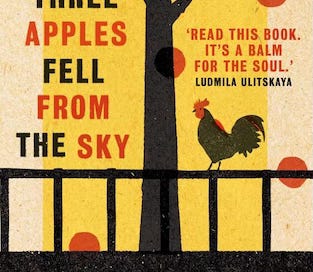Dear writer,
Last week, I read Three Apples Fell from the Sky by Narine Abgaryan and translated by Lisa C. Hayden. I bought the book on a whim and started reading it with very little expectation of what it was about. The book is set in a tiny mountain town in Armenia and covers the timespan of one generation.
Based on the book blurb, I thought it was a love story about a woman in her middle years. It turns out it was about the few inhabitants of the town who are left to grow old after wars, famine, and limited access to the outside world took away the younger generations. It is a love story, but one that is broader in scope and more heartwarming than the usual variety.
One thing that caught my attention was the way point of view was handled. I love books that make me question the usual writing guidelines and this was certainly one of them. As an editor, I spend a lot of time thinking about point of view and how it serves a story and the readers of the story.
Three Apples Fell from the Sky is told in third-person omniscient which means the narrator is telling the story with a wide scope for presenting information. This is used to fill in the details of the past including about ancestors not present in the current-day scene. Much of the story is told in this way and is handled so well that it does not feel like the dreaded info-dump it would normally be called.
While the use of third-person omniscient suited the story and was well executed for the most part, it did on occasion fall into some head-hopping between two characters’ points of view. The first instance did jar me a little out of the story, which is why head-hopping is generally frowned upon.
Over time, I wondered if the technique was, in fact, being used in a very limited capacity on purpose. It allowed for the internal thoughts of two people to be shown in a heated discussion. The subtext of the conversation was such that I think it could have been avoided, but the use was effective because it was tightly controlled and rarely used.
Reading books that push reader expectations is a great way to learn how and why writing advice works or doesn’t. What books have you read recently that fall outside of contemporary reader expectations?
Sincerely,
Shauna
New on the creative roots blog
Writing both inner and outer conflict in a historical novel
How to create your own research and writing retreat
Should you work with an editor on your family history?
What makes an editor qualified to work on historical fiction?
Tidbits for the curiosity cabinet
According to this article, historical fiction dominates big book prizes in recent years.
Are you a visual person? Public Work by Cosmos is a visual search engine for items in the public domain. I love the botanical drawings and old photographs.
Even if you are not interested in learning about your family history, this magazine is a great source for historical fiction research and story inspiration.
Editing availability: Booking now for 2025.





Thanks for the recommendation - on its way to my reader as I type!